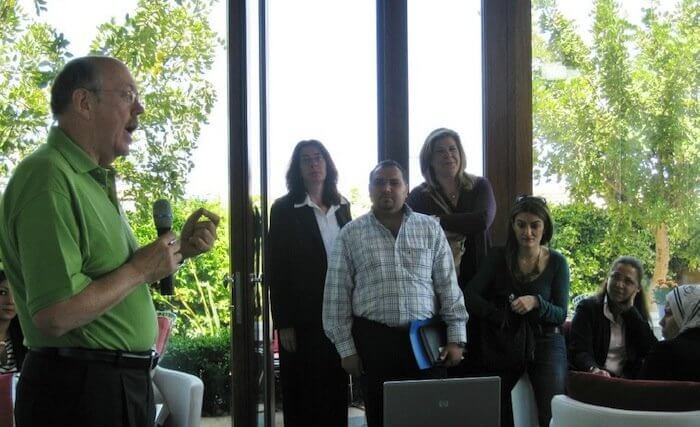With unemployment in the MENA region rising and now standing at 10.3%, the highest regional rate in the world (ILO, 2011), Arab countries alone need to create approximately 80 million new jobs by 2020 (World Bank). It is a daunting goal. One way to address this enormous task and to tackle unemployment is the incubation and support of sustainable entrepreneurship and SME development. The organisation Mowgli, founded by Tony Bury, does its part by providing mentorship to entrepreneurs in the Middle East.
Tony Bury, a serial entrepreneur with over 45 years of experience in the Middle East, believes that a highly effective way to create long term, sustainable employment opportunities is by mentoring, supporting and empowering entrepreneurs who start and grow businesses and helping them to develop their own leadership and decision-making capability. Following that conviction Bury founded the mentorship organisation “Mowgli Foundation”. Mowgli’s mission is to provide mentors who inspire, support and empower entrepreneurs in achieving their business and personal potential, encouraging sustainable job creation, and social and economic development. The organisation achieves this by recruiting, training and matching mentors and entrepreneurs in relational and business mentoring relationships through their unique Mowgli Mentor Experience (MME) programs. The role of the mentor in this relationship is to provide hope and aspiration, to help entrepreneurs build confidence, mitigate risk, focus on individual personal development, expand their business, and address challenges along the way.Interestingly it is not only the entrepreneurs, the mentees that benefit from this relationship and exchange: Bury realized that the mentors, too hugely benefit from the experience through their own personal and leadership development. The learning process is often a period of self-discovery resulting in the development of new skills and competencies that can be applied within their own professional and personal lives. From published reports to Mowgli’s own impact analyses and reports, mentoring has a clear and proven influence on the ability of entrepreneurs to grow their business sustainably, learn, develop and mentor others. It is for this reason that Mowgli strives to place mentoring at the heart of enabling entrepreneurship, as well as personal and business leadership.
To date, Mowgli, run by Tony Bury together with a high-energy team including his daughter Kathleen, has successfully run 24 MME programs in Jordan, Lebanon, Syria, Palestine and the UK. They have trained around 200 mentors and matched them with high growth potential entrepreneurs, from all backgrounds, ages and sectors, to undertake a year-long mentoring relationship supported by Mowgli. In line with their plans to launch in Egypt, Tunisia, Morocco, Algeria, Qatar and the UAE, Mowgli has successfully secured funding to deliver a further 20+ MME programs within 2012-13, training up to a further 240 mentors within the MENA alone.
Q&A with Tony Bury – Founder of Mowgli
What inspired you to start The Mowgli Foundation?
Fast growing markets have produced entrepreneurs, who have developed businesses that have set fantastic examples in fighting unemployment and have greatly contributed to poverty alleviation. The moment I understood their positive role in society, I concluded that we really need to find ways to support entrepreneurs. After extensive research I quickly realised that the thing that entrepreneurs needed the most were mentors, people who support them on their journey. This is how the idea of Mowgli was born.
Initially, I knew little about mentoring. But when I started researching the topic I saw that I myself had many people in my life who to me were mentors, and I began to appreciate the concept. When we started Mowgli in 2008 mentoring wasn’t a widely spread practice in the Middle East, though undoubtedly it is happening informally between many people.
Why is mentorship so important to the Middle East?
The Middle East is faced with dramatic youth unemployment. When we looked into ways of how society could solve this problem, different strategies came to mind. Mostly, however, Arab countries have to get more private sector ownership over commercial businesses. Supporting entrepreneurs, creating SMEs and developing them is one way of going about this.
However, becoming a successful entrepreneur in the Middle East is still largely dependent on what kind of relationships you have in the business community. This makes it hard for many entrepreneurs to get access to interesting opportunities. To support them on their journey and help them get access to these opportunities, we first have to understand how entrepreneurs work. The first building blocks for any entrepreneurs to be successful are their hopes and aspirations. Therefore, the first thing mentoring does is support entrepreneurs in exactly that. I cannot tell you the difference that the following words make to an entrepreneur: ‘I believe in what you are doing and I believe that you are able to do it.’ Just that kind of encouragement is a fantastic experience. It is the whole point of mentorship.
In a next step we focus on business competency, which consists of three components: Knowledge, skills and behaviour. If you have the highest level of knowledge and the highest level of skills but do not demonstrate consistent behaviour, your competency is rated low. This is why in mentorship we focus on behaviour. Whenever you listen to successful entrepreneurs they will tell you that it was a mentor who significantly helped in that area.
The key element that you see in Figure 1 is the personal development journey that we all go through from time to time, including entrepreneurs. You can see that there is a thunderstorm at a certain stage: Each entrepreneur goes through these turmoils. There are three critical moments in an entrepreneur’s life cycle where he/she needs a mentor most: Often, at the very beginning, when financial performance is poor, they are all stressed out and they make wrong decisions. A mentor is exactly the person to talk to because entrepreneurs can hardly tell their friends and family that they are going bankrupt next week. Another critical moment is when entrepreneurs realise that while starting the business was fairly easy, they do not necessarily have the skills to grow the organisation at a later stage when processes and structures are needed. A mentor can assist in deciding what additional skills the entrepreneur needs and needs to bring in at this growth stage. The third critical moment is when an entrepreneur becomes very successful, his ego may start to grow and he/she begins to make decisions that are not in his/her personal or business interest. A mentor can help check this behaviour.
The importance of mentorship in the Middle East goes far beyond supporting entrepreneurship to developing different models of leadership. My definition of leadership is simple: To serve is to lead; if I serve you and you follow me and then I will become a leader. The greatest thing that one human being can do for another is to mentor them and if you cannot mentor, you cannot lead. That is why I believe mentoring is so important: it actually develops leadership.
Our mentors give their time to entrepreneurs without expecting anything back or receiving financial compensation, but they always confirm that they get such joy from doing it. They enjoy seeing their mentees develop their decision making and leadership capability around the advice that is given and that the guidance and support is appreciated. Mentors therefore get just as much out of the mentor/mentee relationship as the entrepreneurs that they are supporting and often say that the mentee actually becomes their mentor. Many have come back to me and told me that being a mentor has helped them deal with challenges in other, sometimes more personal, areas of life as well.
What are the major do’s and don’ts of mentorship?
Of course, a mentor is someone who listens and tells you the truth and not necessarily what you want to hear, but at the same time they should not be judgemental. What is also really important is that the mentor should not have any vested interest in the performance of their mentee. For instance, if the mentor has an interest in shares of the entrepreneur’s business then that corrupts the value of the mentorship program.
The other aspect that is really important for a mentor is that in case of failure they do not criticise their mentees or discourage them, but support them in getting back up, celebrating and learning from the experience. In the future, I would like mentees to share their failures because it is so important to share these experiences with the community, especially in the Middle East.
The word “Mentor” is often greatly misused: Some people think of mentoring as providing advice, others think of coaching as mentoring. In reality coaching is about performance enhancement. In mentorship the mentor needs to be able to be involved and understand what are the issues in the entrepreneur’s personal life, which is impacting his or her business life and vice versa. It requires a high degree of trust. Mentors as a rule have to have or to develop a high level of emotional intelligence.
Are the relationships between mentors and the entrepreneurs continued after the Mowgli program?
Following the 3 day mentor training and mentee-mentor matching program, we facilitate a one year mentoring program and after that the mentor and the entrepreneur are free to continue their relationship on their own. Although they remain part of the Mowgli Family (alumni), we do not monitor them for our official impact reports. Of the 80% of the relationships that last the one year with Mowgli, 97% go on to a second year, and so far 95% have gone on to the third year. The relationship with the mentors doesn’t have to be maintained on a daily basis, but if a trusting relationship is developed, they usually remain in your life. In addition, both parties need to understand that the mentorship relationship is absolutely symbiotic, if it is not, the relationship falls apart. In fact the mentees are the drivers of the relationship: if they do not keep in touch with the mentor, the relationship will fail.
One of the greatest benefits of our Mowgli program is that we partner entrepreneurs up with one “official” mentor but during the program they are able to benefit from numerous unofficial mentors at the same time. It is this experience that we try to provide and that we hope contributes to the sustainable success of entrepreneurs in the Middle East.
Tharawat Magazine, Issue 15, 2012
















